“Anxiety is the dizziness of freedom.” –Soren Kierkegaard
“…There is a darker side to adolescence that, until now, was poorly understood: a surge during teenage years in anxiety and fearfulness. Largely because of a quirk of brain development, adolescents, on average, experience more anxiety and fear and have a harder time learning how not to be afraid than either children or adults. Different regions and circuits of the brain mature at very different rates. It turns out that the brain circuit for processing fear—the amygdala—is precocious and develops way ahead of the prefrontal cortex, the seat of reasoning and executive control. This means that adolescents have a brain that is wired with an enhanced capacity for fear and anxiety, but is relatively underdeveloped when it comes to calm reasoning.” —Richard A. Friedman, “Why Teenagers Act Crazy”, The New YorkTimes; June 29, 2014.
July 6, 2014
My next episode of PRETTY LITTLE LIARS, the 100th, airs on Tuesday night, July 8, 2014. Five seasons in and 100 episodes later PRETTY LITTLE LIARS shows no signs of either solving its central mystery or losing its audience. I’ve puzzled over this conundrum, but it seems to confirm what I felt about the show when I first wrote about it in its initial season. It’s less about its mystery and more about the feelings it generates regarding the unknown. PRETTY LITTLE LIARS works as a metaphor for our central human experience: we have no way to objectively know about anything, no way to move forward with certainty, and yet move forward we must. We stumble through life, trying to find our own way, not knowing whom to listen to, whom to trust, whom to suspect, what to believe. But in that process we discover our most authentic selves.
While the show has the reputation of being “a guilty pleasure,” I’ve been staggered by the wonderful writing about it on the internet, analyzing the show’s deeper implications.
Alice Bolin, THE LOS ANGELES REVIEW OF BOOKS:
“With its bizarrely powerful villain and its bizarrely complicated plot, PRETTY LITTLE LIARS reminds me of nothing so much as a fairytale…. The woods figure importantly in PRETTY LITTLE LIARS too, with the show’s lead characters meeting in them, being chased in them, pursuing a girl in a fairytale-friendly red-hooded coat who looks so much like Alison through them — is she dead or isn’t she? The woods are shadowy, uncertain places, sympathetic to secrets, magic, transformations, and cruelty.
“Fairytales are weird, distilled expressions of our inherited desires, and the Dead Girl Show, and its idyllic, uncanny small-town setting, is absolutely in the same tradition. Dead Girl Shows often experiment with the incest taboo. Characters on PRETTY LITTLE LIARS, VERONICA MARS, and TOP OF THE LAKE all have romances with characters who they later learn could be their half brothers. This goes back to Freud’s favorite myth, Oedipus, in which a prince is fated to kill his father and marry his mother, and the psychological metaphors of Gothic literature, and the imposing persistence of patriarchal authority. My bad dad is your bad dad, it’s as if to say, is everyone’s bad dad.
“Since the first text from the ambiguously named A, the main question of Pretty Little Liars has been not who killed Alison, but whether she is dead at all. In her friends’ memories of her, she is terrifying and manipulative; a major theme in the series is how she controls them even after death with the secrets she knew. The girls often have ambiguous, vivid visions of her. As the abjected maternal returns, so this Dead Girl persistently becomes a presence in a story that was supposed to be about her absence. What would seem to be Pretty Little Liars’s worst faults — its unwieldy plot, its lack of consistency, the culpability of so many characters — are actually instructive. Its creators have made a Dead Girl Show that is not about a journey instigated by a Dead Girl body toward existential knowledge, but the mess, the calamity, and the obscurity that are the consequences of misogyny.”
“PRETTY LITTLE LIARS’ portrayal of how girls talk to each other and think about their social experiences seems authentic, rather than defiant or designed to teach viewers a lesson: The girls are highly sensitive to one another’s feelings, and each is constantly checking on how the other three are coping with the various dramatic episodes in their lives. They build intimacy by trading stories about the minutiae of their daily lives, listening patiently and enthusiastically to even the smallest of their friends’ stories. And while it may seem mean-spirited to delineate a clear ‘us’ and ‘them,’ their relationships are strengthened by knowing exactly who their best friends are and aren’t. The show also sidesteps stereotypes about high-school romance and its seemingly antagonistic role in relation to friendship. The girls are neither ‘too chaste’ nor ‘too slutty,’ neither too commitment-oriented nor too hookup-oriented. They churn through a lot of boys and girls — and how awesome is it that the show includes a non-stereotypical lesbian? — but one thing stays constant: Boyfriends and girlfriends are second-string to best friends. By later seasons, a few of the beaus band together to help the girls battle ‘A,’ but their social lives revolve around the four friends. The ‘liars’ are a magnetic vortex that reorients all social interactions toward themselves.”
Jacob Clifton, Gawker “The Morning After”:
“A show centered visually on the spare eternal sunsets of Edward ‘Nighthawks’ Hopper’s lonely paintings, and on the retro aesthetics of Hawks, Huston and Hitchcock, PLL never ignores the chance to bring those things into the narrative. (One episode saw another character, Spencer Hastings, abuse ‘study drugs’ to the point that she slipped sideways into a black-and-white version of the show itself.) There is a certain drive to educate here, as evidenced by the progressive/problematizing sexual politics as well as the show’s creators’ rich basis in film and fashion history.”
The quotes above capture my own feelings about the show: the fairy tale references, the avoidance of high school clichés, the stripped-down lines of Hopper, the retro feeling of studio films, with their artificial backdrops and dreamlike settings (I’ve never been a fan of taking the show off the backlot because I feel the whole construct falls apart when it’s placed in the harsh glare of the “real world.”)
As a director, the metaphor of a dream helps me makes sense of the byzantine nature of the narrative. It ultimately doesn’t matter to me who did what to whom; what matters is how the dramatic event of any particular scene makes the audience feel, and how it awakens the viewer to his or her own unconscious, to his or her own imagination. Using dreams as a reference point helps me dig into the more archetypal nature of the narrative tropes.
For instance, much to the consternation of many of my twitter followers, I find the idea of a student-teacher relationship distasteful—it’s a boundary violation that I find hard to accept in actuality, particularly when we’re discussing someone underage. But in the narrative of the show I am able to leave that aside and focus on its psychological implications; I have come to see that it is wish fulfillment, a dream expression of an emerging female sexuality that challenges male authority. Like GOSSIP GIRL before it, PRETTY LITTLE LIARS presents high school students as adults, functioning in the world as autonomous beings, each deciding for herself or himself what is and is not acceptable, as opposed to accepting without question the moral framework of society, religion, or the parents (in fact the parents in PRETTY LITTLE LIARS are all morally suspect.) It is only in understanding our autonomy that we grow.
Where I depart from the “shippers,” as they call themselves, is the idea that any of these female characters should define themselves by their relationships. I like that the show promotes the friendship of the women over their romantic entanglements, and promotes the idea of their individual development as something that’s completely separate from whomever they currently love.
Furthermore, none of the male characters are as powerful or as interesting as the four central female characters. The men work best as representations of the current stage of a particular female’s psyche. The men function as catalysts, and are certainly important to the development of the story, but the relationships are not the goal. I do not see romance as being what’s central to the success of PRETTY LITTLE LIARS. Instead I like to think that the “endgame” is individuation.
I love the premise that PRETTY LITTLE LIARS is about facing the shadow, individually and collectively, and not succumbing to the fear and paranoia that have become so prevalent in our age. I think it’s a powerful statement to suggest that no matter how dark, frightening, disappointing, confusing, or puzzling events may be, that the individual psyche can expand in the face of it and ultimately triumph.
Social media has been such a big part of the success of the show, and a whole industry of fan fiction and discussion has arisen around it. I’ve been fortunate to interact so directly with people who love the show, and my other shows as well. I learn so much from what they feel passionate about, what they dislike, what they celebrate. Often I’m accused of taking their feelings too lightly or dismissing them, but quite the contrary is true. I listen and learn.
I have to continually remind my followers on Twitter that I do not write the show, and have no input into its storyline. I am but one guest director among many, and I am fortunate that I’ve been invited back to work on PLL again and again. The writing staff and the crew have become my dear friends, but I don’t get to decide what happens; I work with the script I’m given and tell that story to the best of my ability. What I try to do with each episode is to inspire the imagination, to find the visuals and the emotion within each scene that can continue to inspire the passion amongst its audience. And I hope with the 100th episode and beyond they will continue to enjoy the ride.

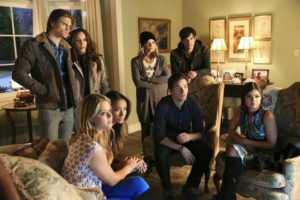
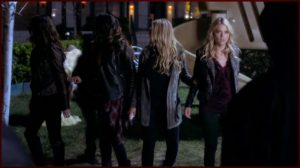
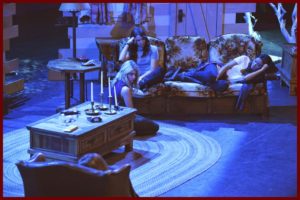

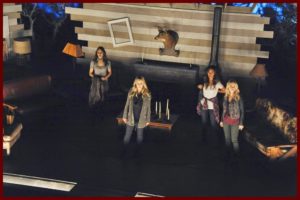





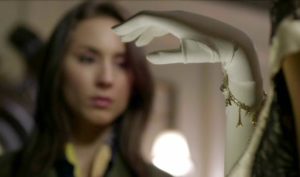
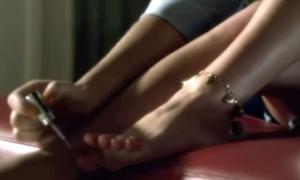
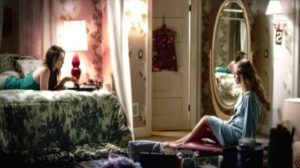

Leave a Comment